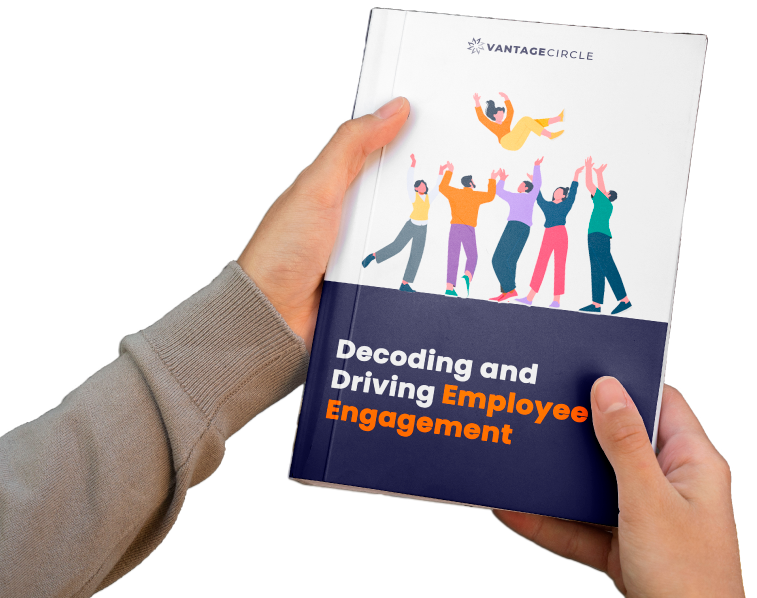7 Meaningful Ways To Reject Hustle Culture At Work

A Global Employee Recognition and Wellness Platform
For many of us, our 9-5 job is more like the rise and grind until the work is completed. But many employees become a part of the hustle culture where they overwork or keep grinding more than expected. Usually, Millennials and younger generations are working relentlessly, taking gigs and freelancing above their daily jobs.
Overworking is the reason that gives birth to stress and burnout along with toxic productivity, and today we will discuss the same.
This article will discuss hustle culture, how it affects the work environment and company culture, and how leaders can reject it meaningfully.
Let’s start with the basics:
What is Hustle Culture?
Hustle Culture is often referred to as burnout, grind, workaholism, or toxic productivity. It is all about working constantly, and employees who hustle harder tend to devote more and more working hours than required.
An outsider might view hustle culture as an energetic, motivational way of working. For many employees, working extra hours is the step to climbing the corporate ladder faster, and it is about making six figures in the shortest time. This is a common phenomenon because people usually believe that working hard helps you achieve what you want.
But, this is possible only if you devote 100% of your time to work, give up sleep, and maintain a good and healthy life despite your hustle, which is technically impossible.
But hustle culture is on another level. It's self-destructive and delusional, and people equate it with productivity, but in reality, it's not.
Practicing this culture might help you accomplish more tasks in a shorter time, but it leads to poor mental health, anxiety, and stress.
Questions to Address While Understanding Hustle Culture
As leaders, you must understand the people involved in hustle culture and address the following questions.
- Why are employees working so hard?
- What influenced workers to clock in the extra number of hours and go above and beyond?
- Is it due to a lack of proper rewards and recognition?
- Are you not working towards enhancing employee engagement at work?
- What could be the consequences of working long hours every day and week?
- What must you do to reject such a culture that hampers employee health and engagement and triggers employee burnout at work?
Signs of Hustle Culture at Work
There are easier places to work, no one ever changed the world in 40 hours a week - Elon Musk
Many workplaces applaud overworking and giving promotions and raises. Many people have worked extra hours to get applause from their leaders. According to a Harvard Business Review, many employees pretended to work 80 hours weekly for attention and were applauded as “star performers” and superheroes. Employees who worked stipulated work hours were denied promotions, which are signs of a hustle culture at work.
Hustling or overworking acts as a badge of honor but often comes with fear, guilt, and shame, particularly if you do not want to be a part of the rat race. As a result, an employee is bound to:
- Feel obligated and say “yes” to taking tasks even if they are over-committed.
- Feel hesitant to take breaks, sick leaves, and casual leaves.
- Answer calls on weekends and replies to emails after work hours.
- Push themselves above and beyond and forget to stop when they’re tired.
- Stay online or active to calls and messages after work hours, especially if they are working from home.
The Hustler Mindset
Workers involved in grind culture always believe they will receive rewards if they make extra efforts. The more they work, the faster the rewards come their way.
An average hustler thinks that their identity revolves primarily around work, and their job is the one that makes them; hence they keep working more hours for that extra attention.
Here are some signs of toxic productivity at work:
- Working long hours
- Bragging about overwork and not getting enough sleep
- Saying they are exhausted, yet they force themselves to work
- Counting their cups of coffee, they drank to stay awake and work all night
- They think taking breaks is a waste of time
This work culture encompasses an obsessive work ethic and never-ending productivity.
Is Hustle Culture Toxic?
The objective of grind culture is to preach that road to success is difficult, but with hard work, one can overcome and succeed. However, people fail to foresee the adverse effects that come with it, and lately, it has turned out to be toxic.
According to the World Health Organization (WHO), overworking is extremely dangerous. According to their study, working 55 hours a week kills around 745,000 people annually. The report also finds that overworking increases stroke risks by 35 percent and heart disease by 17 percent. Hence, hustle culture becomes toxic and dangerous to employee health at one point, worsening their work-life balance.
Another study by the U.S. Bureau of Labor Statistics mentions that overworking decreases productivity by 68% in employees.
We can say that grind culture is toxic because it also leads to:
- Burnout and chronic stress
- Depression and anxiety
- Cardiovascular diseases
Thus, hustling is a sign of an obsessive-compulsive disorder that needs immediate attention as it develops toxicity in employees’ minds.
Ways to Reject Hustle Culture
It is always easy to mention the problems and cons of hustle culture, but how can one avoid being a victim of it? Let’s look at how leaders can help employees reject this toxic workplace environment.
-
First, you must understand how this culture affects you and what it is doing to you. Begin by changing your mindset.
-
Overworking leads to burnout and other physical and mental health issues. If you feel exhausted, you won’t be able to perform as you expect, and eventually, you’ll see a downfall in your productivity.
-
You must encourage your employees to learn how to set boundaries. Tell your employees to stop replying to emails and messages on Slack after work hours. They must know when they must stop working.
-
You must communicate with your colleagues about your work hours, and you won’t clock in more than what is required in a day.
-
Encourage employees to take necessary and short breaks. Let the hustlers hustle, but taking breaks during work always enhances employee productivity.
-
Never feel guilty for not doing more or extra. Listen to your body first; take it if you feel like taking a break. Do not bother anyone’s comments on why you take so many breaks. Your body and health come before anything else.
-
Most importantly, always listen to your mind and your body. Overworking is not the solution to success; smart and healthy working is.
In Conclusion
Even though the whole concept of this article seems negative, we shall conclude this on a positive note. Life is more than just about work; hustle culture is not the reality.
We must work hard but also reap the benefits and beauty of small things in life. We must appreciate what we already have and must thrive for more by not hustling but planning.















